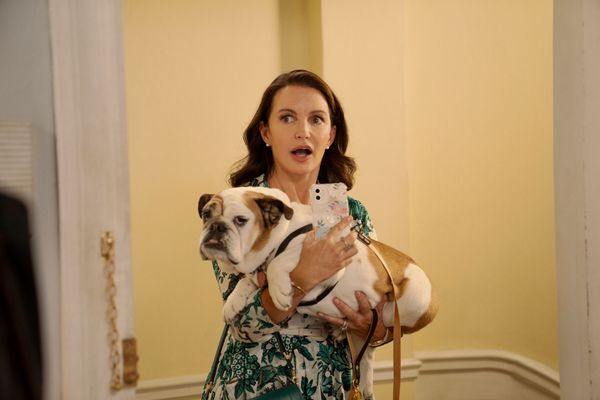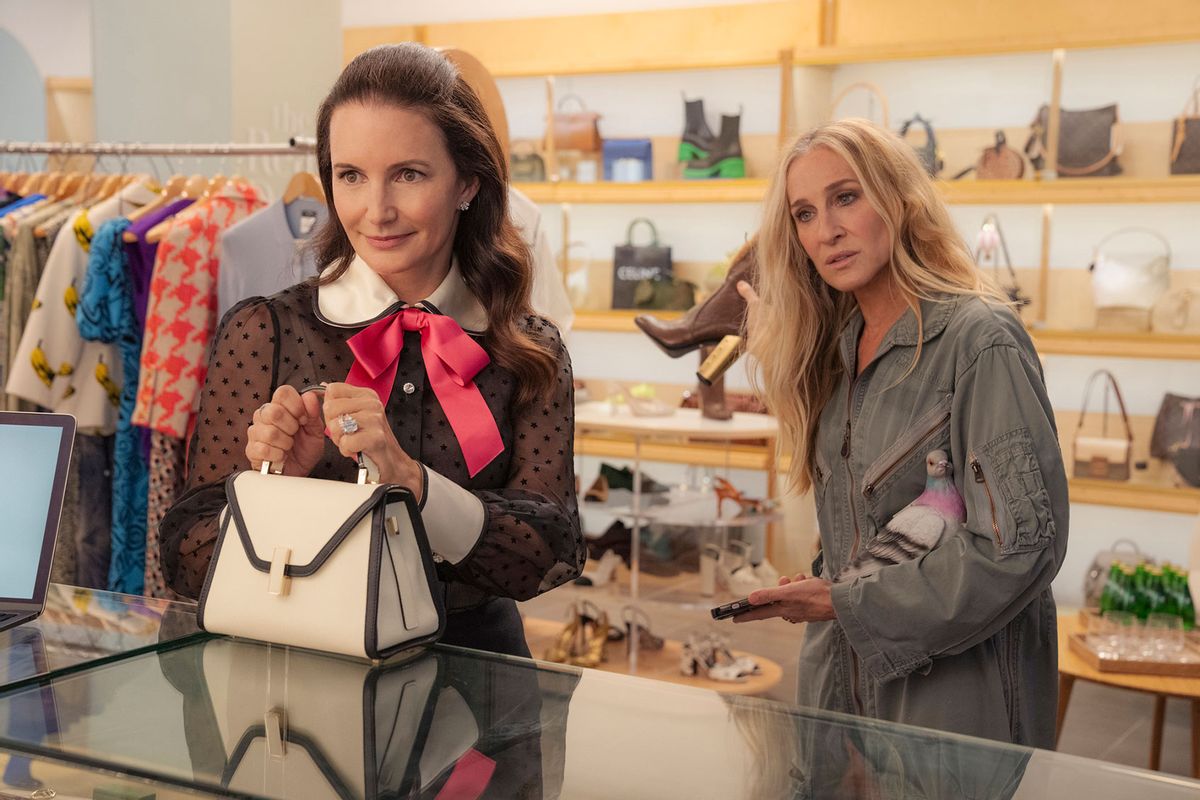Charlotte York Goldenblatt could use better friends.
To the casual "Sex and the City" voyeur, this concept is incongruent with its mission. That show marketed a lot of merch and trends, but topping its bestseller list was, and is, the resilience of friendship. And Charlotte (Kristin Davis) came through the '90s and early '00s the most consistently supportive and supported bud, if not the one most people wanted to be likened to in those character quizzes.
This continues in "And Just Like That …" when Charlotte, by force of will, adds filmmaker, fine art collector and fellow rich lady Lisa Todd Wexley (Nicole Ari Parker) to her clutch of ladies who lunch. Charlotte initially pursues Lisa because she's a distinguished Black woman, and Charlotte decides she and Harry (Evan Handler) need more people of color in their social circle.
But she and Lisa turn out to be more alike in important ways than, say, she and Carrie (Sarah Jessica Parker) or she and Miranda (Cynthia Nixon), her remaining confidantes in a group that once included Samantha Jones (Kim Cattrall), who Charlotte tolerated for Carrie's sake.
When Charlotte scores an invitation to the Met Gala, it's Lisa who shares her fitting appointment for her bespoke gown, not Carrie. (Surely not Miranda, who has flitted off to L.A. to get her some more Che Diaz, played by Sara Ramirez). And when uptight Charlotte explodes upon discovering her eldest child Lily (Cathy Ang) consigned a slew of designer items in her closet with a local luxury resale chain called The Real Deal, only Lisa truly understands her rage.
"And Just Like That" remains style-forward, but subplots like this betray its tendency to lag a few steps behind the conversation.
"This is blasphemy," Lisa affirms after glimpsing Lily's miniature Chanel offered up online, like some common rag – and marked down, no less. "I think that's Lagerfeld's last collection. In a few years it'll be worth three times that."
"Four!" Charlotte spits, adding, "I am furious! Can I sue?"
This would have been a fine time for Lisa to advise Charlotte to let these threads go. Maybe Lisa didn't realize Charlotte was serious. If she had, she might have stopped her new pal from marching into one of The Real Deal's physical locations and demanding they return a dress her child has outgrown. "They took advantage and they took my Chanel!" she chirps.
All it would have taken is a simple warning: "This is Karen behavior." Friends don't let friends trend in that direction. Real ones save us from ourselves. But Lisa is an enabler, as is Carrie, who flanks Charlotte as she accosts the Real Deal clerk and growls out the signature line of her type: "Listen Eden: My husband is a partner at a major New York law firm. So you might watch your tone, or I'm going to call your manager!"
When "And Just Like That" resumed Carrie, Miranda, and Charlotte's New York adventures in 2021, and in their 50s, the show's creator Michael Patrick King did his personal best to make up for the original version's heteronormative whiteness by inserting two Black women, including Lisa, Columbia professor Nya Wallace (Karen Pittman) and real estate broker extraordinaire Seema Patel (Sarita Choudhury) into their lives. As a reminder, King's best efforts at inclusion also consist of "2 Broke Girls," which memorably featured one of TV's cringiest Asian stereotypes imaginable.
If the first season stumbled through awkwardly welcoming non-white, queer characters into its fold, a mission the show still hasn't entirely figured out, the second yanks our attention to the wear and tear time has visited upon their quirks.
Bringing Lisa, Seema and Nya into the fray also brought each veteran character's personality flaws into relief – including the supposedly sexually inquisitive Carrie who, in her podcast with Che, a nonbinary comedian, discovers she's uncomfortable slinging slang referring to the vagina. This hesitance continues in the new season where, on her podcast, she balks at referring to down there as, um, down there in a sponsorship segment.
 Nicole Ari Parker and Kristin Davis in "And Just Like That" (Craig Blakenhorn/Max)
Nicole Ari Parker and Kristin Davis in "And Just Like That" (Craig Blakenhorn/Max)
But the shape that Charlotte's shock at Lily's closet clearing takes makes her previously adorable affectation not so cute. "Sex and the City" is a cultural influencer that predates TikTok and Instagram, setting the bar for fashion and au courant activities like drinking Cosmos and weekly brunches. "And Just Like That" remains style-forward, but subplots like this betray – or is the right word fulfill? – its tendency to lag a few steps behind the conversation when it comes to sociocultural matters.
In these opening episodes, Charlotte is the same tightly wound princess she's always been. But the child-sized Chanel mess brings out a side of her that's very 2020.
The term Karen is common enough that it has gone from being feared by white women to explained by Parade magazine to being reconsidered as a sign of empowerment: "Are You Being A Karen, Or Are You Just Assertive?" asks a HerWorld.com headline. To the writer's credit, the point of the article is to let whoever needs to get the message know that Karen-qualifying behavior is not acceptable.
Nobody, or not enough people, conveyed that message to Charlotte, although it's unclear whether that's what King and his co-writer Susan Fales-Hill were going for or whether they simply wanted to have fun with Davis' character showing out. If it's the second desire, we're left with the realization, or reminder, that all this time "SATC" fans have been applauding a Karen.
And Eden of The Real Deal, who probably earns an hourly wage, is the most recent visible casualty of her self-involvement.
Perhaps that's the point. Charlotte cannot ever cease making every situation about her and how she sees the world. When Miranda breaks the news to Carrie and Charlotte that she's leaving Steve for Che, who seduces her with a cloud of shot-gunned weed smoke and nimble fingers, Charlotte can't wrap her head around Miranda's queerness. Even during that lunchtime conversation with Lisa, with her best male friend Anthony (Mario Cantone) in attendance, when Lisa tries to change the subject by ordering a vodka tonic for herself and Charlotte, Ms. York Goldenblatt can't take the hint.
"Why the day drinking, you might ask?" she teases before explaining that her judgmental mother-in-law is coming over with her sorority sisters for afternoon tea, adding, "And she's the president of the Comments That Cut Like a Knife chapter!" This slices an opening for all kinds of follow-ups or commiseration. Nope.
Charlotte responds to Lisa's distress with, "I'm just so surprised at Lily. It was a gift!"
Overall Charlotte remains a good person. But she's also an example of a nice white woman who demands and expects things she isn't owed.
Season 1 of "And Just Like That" gave rise to a small consensus that out of all the show's characters, new and returning, Charlotte emerged on the other side as the least odious and most solidly herself. Miranda transitions into her 50s clumsily and racially clueless. Carrie loses Big and her mind for a while, so we excused her faceplant into widowhood and applauded her when she found her footing again.
Charlotte remained Charlotte, more or less – prissy but ultimately understanding, making motherhood her measuring stick for success. She supports her child Rose when they came out as gender-fluid and wanted to be known as Rock (Alexa Swinton) because that is what the best mothers do.
These examples and others lend validation to the argument that Charlotte is more progressive than "Sex and the City" viewers gave her credit for being in the past. The reality is a little more complicated, as the dress fit demonstrates.
 Kristin Davis in "And Just Like That" (Craig Blakenhorn/Max)
Kristin Davis in "And Just Like That" (Craig Blakenhorn/Max)
In "Sex and the City" Charlotte always strove to be proper and was often wrong in the process. Back in the '90s she tsk-tsked at Samantha's usage of the phrase "Black talk" and informed her the politically correct way to say such things is "African American talk." (No. No, it wasn't, and no, it isn't.) Charlotte also inserted herself in a circle of powerful Manhattan lesbians so she could have new experiences, hiding her straightness until she couldn't.
Want a daily wrap-up of all the news and commentary Salon has to offer? Subscribe to our morning newsletter, Crash Course.
Overall Charlotte remains a good person. I can't picture her allowing Richard Burton to totter off-leash in an area reserved for birders in Central Park, let alone threaten the life of a man calling her on such a transgression. She's a stickler for following guidelines. But she's also an example of a nice white woman who demands and expects things she isn't owed and attempts to enforce rules nobody asks her to.
Battling the wave "And Just Like That" created is as senseless as Charlotte's tirades. If you understand that few if any of the millions watching will ever age into this lifestyle then, like Seema's many lays, it's a harmless good time — a fantasy of maturing chicly even after, say, accidentally urinating on oneself after hip surgery. If Carrie Bradshaw can recover from that, why not us?
But do not mistake Charlotte for the one who has it all figured out, even when it dawns on her that her "speak to the manager" ire is less about how she loses Lily's couture than losing her little girl. When Carrie, a beat or two too late for Eden, warns Charlotte of how close she is to becoming a meme, the Chanel crusader comes to her senses.
"I don't need that dress. I have the memory. And Lily! Whoever she is now," she tells Carrie before adding, "Let's go." There's no indication that Charlotte apologized to the young woman at the store. Why should she? Moving on is more in character. And Carrie doesn't hold her buddy accountable for her abusive behavior. She's just there to buy shoes.
"And Just Like That" streams new episodes Thursdays on Max.
Read more
about "Sex and the City" & "And Just Like That"

Shares